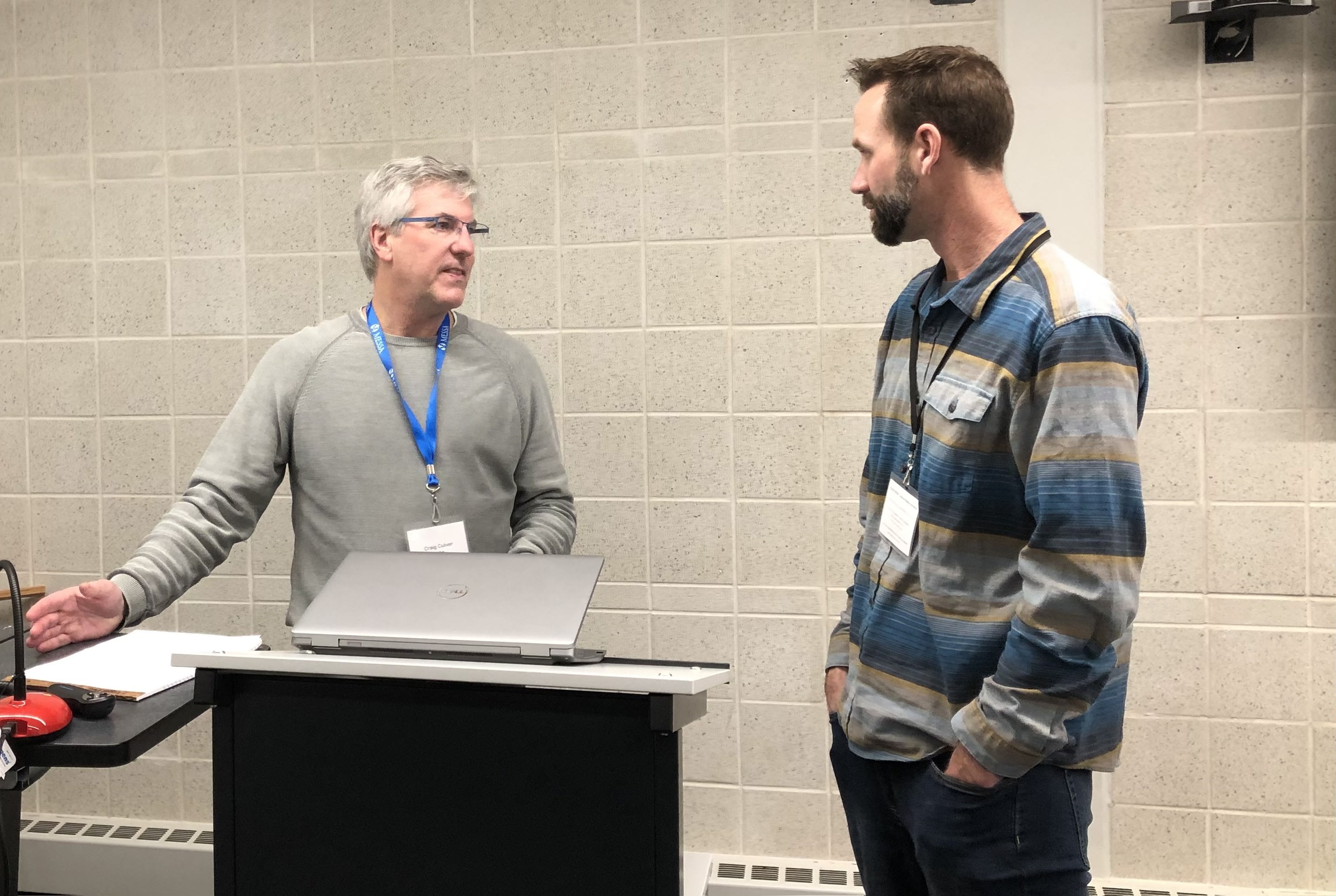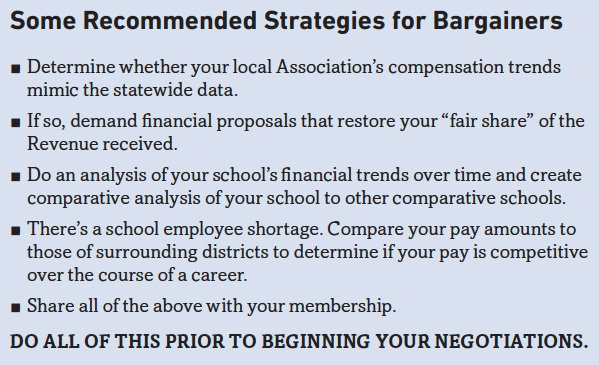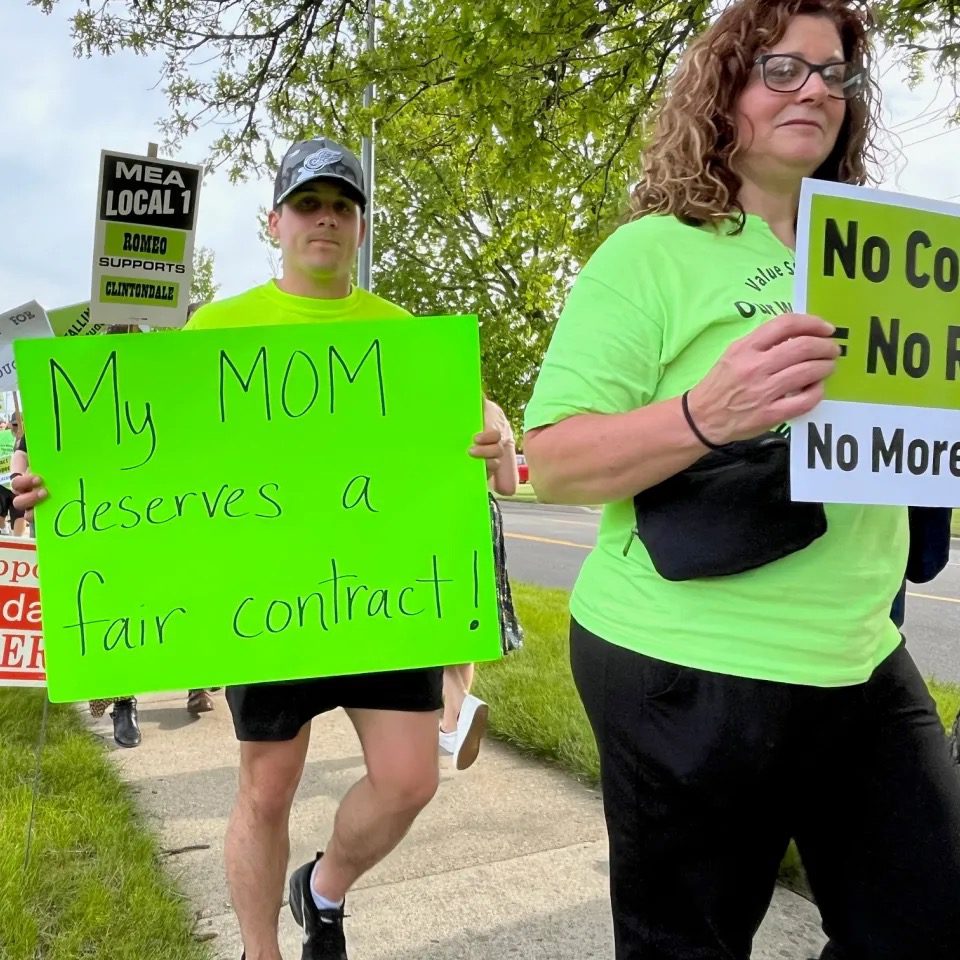MEA bargaining tools arm local teams with powerful narratives
As local bargaining teams head to negotiating tables this spring, MEA has new data showing in many places educator compensation has not kept pace with school funding increases, information which could be used to justify significant pay increases.

Statewide trends show all school employees’ compensation as a share of total school district expenditures has fallen from 82% before the Great Recession of 2008 to 77% in 2021 — which is an all-time low, according to MEA’s Statewide Bargaining Consultant Craig Culver.
Bottom line: Gov. Gretchen Whitmer has presided over a significant increase to the state’s education budget over four years, and overall pay increases have not kept pace. Culver’s calculations and figures do not include federal COVID-relief money which was one-time funding to address the pandemic’s challenges.
“The irony is the administrators’ total compensation (as a share of total expenditures) has remained flat,” Culver said, “so they have kept their share of the pie, but the rest of the employees statewide have lost pieces of the pie.”
Statewide and local trends do not parallel each other in every place, but “Where it exists, union leaders and bargainers must make it their ‘mission’ to restore lost compensation to their members and adopt strategies and best practices to succeed,” Culver wrote in a report issued by MEA’s Statewide Bargaining Strategies and Implementation Team.
The Cost Alignment Calculator, designed by Culver, produces historical trends and district comparisons — using state-audited data that are undeniably accurate — to tell a story and make a case at the bargaining table, Culver said.
Much of the data needed for the Cost Alignment Calculator is now available to most bargaining units in the state thanks to the new automated district financial analysis developed by MEA Economist Tanner Delpier.
“There’s not a state association in the country that has better tools than what MEA has developed in-house to serve our members,” Delpier added.
At a recent bargaining retreat in Gaylord hosted by the Northern Michigan Education Association — attended by 35 bargaining units from the area — Culver shared an example from a district where a teachers’ unit has had compensation as a share of expenditures drop from 60% to 52% over the last five years.
Simply to bring that number up to 55% — not even back to the highest five-year point but to the average percentage over those years — would require a 13% pay hike, he noted to audible gasps in the crowd.
“The point isn’t to do all this financial analysis so you can look at it and be mad,” Culver said. “Tell it to your members prior to beginning negotiations; resolve to get it back; lay the numbers out on the bargaining table, and tell your administration, ‘Here’s how much you’re under-spending on our unit, and we’re going to bring you a proposal to solve that.’”
Another angle to pursue in documenting the need for a compensation increase is to compare current pay structure against comparable districts in the area, Culver said. Especially useful is an analysis MEA’s bargaining department can provide that compares salary schedules over a 30-year career.
“We’re doing a lot of this career earnings analysis to get people to think about not just necessarily bargaining a good percentage on their salary schedule, but to make sure they’re bargaining a good percentage on a good schedule.”
 Jamie Roster, president of a unit representing office workers and paraeducators at Traverse City Area Public Schools, heard Culver’s presentation in Gaylord and said she looks forward to going to talks with the district this spring armed with new information.
Jamie Roster, president of a unit representing office workers and paraeducators at Traverse City Area Public Schools, heard Culver’s presentation in Gaylord and said she looks forward to going to talks with the district this spring armed with new information.
School support professionals are struggling to make ends meet and the district can’t fill openings, said Roster, who works as lead administrative assistant at an elementary school.
“Ours is the group in the trenches,” she said. “We are the one-on-one aides for special-ed and medically fragile students; we’re the (preschool) assistants. We’re managing behaviors and expected to act like nurses in the office even though we’re not nurses. And ours is the group living paycheck to paycheck.”
Marlene Bailey, a 42-year educator who’s been teaching in Elk Rapids for 23 years, is part of a bargaining team for the first time ever this year and said she felt “really shocked” but better prepared by the information Culver presented.
“When you have the substance and the information to stand on, it gets you — I want to say fired up but not so much that as it gets you grounded in your own position,” she said.
Culver and Delpier regularly travel the state conducting trainings and working with UniServ directors to support bargainers. At a recent Saturday training in Kalamazoo, the bargaining team from Portage Public Schools said they built confidence from the information presented.

The team hadn’t seen their Cost Alignment Calculator yet, but regardless of the exact percentage increase the team pursues, “this tool lets you see that a big number that sounds too big may not be when you look at this historical data,” said Matt Caramagno, local vice president and bargaining team member.
“Teachers have been underpaid for so long that seemingly large increases are needed to close that gap, and this tool lets people see that more easily. And having more people with the knowledge of what’s fair and what we deserve gives us more strength.”
Pearl Rojas-Brown said she hopes the same is true for members of her unit, the Kalamazoo Support Professionals (KSP). The office staff, paraeducators, teaching assistants, campus safety and transportation employees have felt under‑valued and dispirited in recent years, she said.
“We’re hoping with all of this information that we can build some momentum,” said Rojas-Brown, an associate teacher in the pre-kindergarten program. “If one droplet can create a ripple, then more of them can make a wave.”



